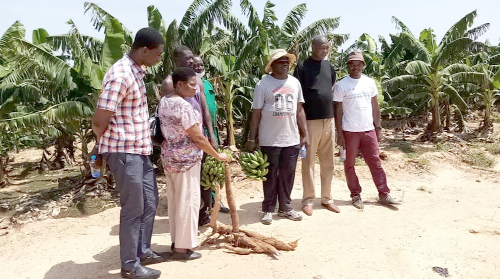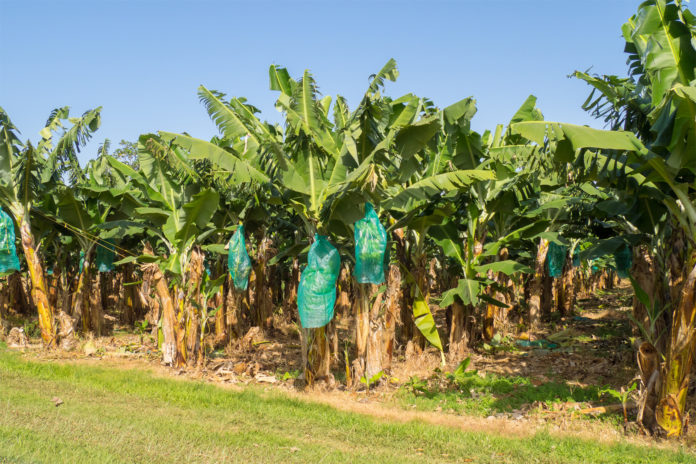A banana plantation, believed to be the first-ever in the Upper West Region, has been developed by a former Vice-Chancellor (VC) of the University of Cape Coast (UCC) in the Central Region, Professor Domwini Dabire Kuupole.
The seven-acre banana plantation was first cultivated in 2013 at Ketuo about six kilometres from the Hamile international border post in the Nandom Municipality of the region.
Prof. Kuupole’s foray into agriculture has yielded fruit as the crops have been doing very well since they were planted and the produce is being sold out on the market by women, mostly widows.
Aside from that, Prof. Kuupole has also cultivated a three-acre cassava plantation on the land. The wonder of all this is that the two crops which are alien to the region are doing well.
Who is Kuupole?
A French scholar and academician, Prof. Kuupole, after handing over the position of Vice-Chancellor of Cape Coast in 2016 and with the support of friends, established the Kuupole Foundation with the aim of educating brilliant needy students with the emphasis on education, health and agriculture.
To this end, he constructed a modern library stocked with 1,400 books of various subjects in 2019 at Nandom. According to the former VC, what he has done is not just to improve the nutritional supplements for the people, but also to pay back to the society where he grew up to become one of the scholars to attain the high standard of becoming a VC of UCC.
The professor’s exploit in the cultivation of banana in a region not known for the crop may not come as a surprise as, one of the vibrant industries that has over the years put the Upper West Region (UWR) in the limelight globally is agriculture.
This industry has survived not because it has had all the support it needs to flourish, but because the people in the region have the passion and the requisite skills to produce the crops and animals for their survival.

The crops and animals include maize, yam, groundnut, millet, soybeans, rice, vegetables, guinea fowls, cattle and ruminants.
Almost every household in the region has someone or more persons engaged in the cultivation of these crops during the farming season. Thus these foodstuffs are displayed in the local markets for consumption as their main diets, as an avenue for the creation of jobs and the promotion of sustainable economic growth.
What is however making the agriculture industry more interesting this time round is the introduction of banana cultivation in the area where these traditional crops have dominated, leading to the creation of employment and an increase of income along the banana value chain.
Farm visit
Conducting the Daily Graphic round the farm, known as Kuupole Farms last Saturday, Prof. Kuupole, accompanied by his wife, Prof. (Mrs) Alfredina Kuupole, said his banana and cassava experiment were to open the eyes of the people, especially the youth, that such crops could grow successfully in the area.
Surprisingly, he said while working on the basis of his foundation, he obtained his first banana suckers not from the southern part of the country but from a friend in Burkina Faso who said Ghana could also have a banana plantation in its northern part and that the crop could grow everywhere provided the crop was cared for.
As a result of the success of the two crops, he said he was hoping to expand the project for the two crops to flood the market, by engaging more youth of the area on the farm, building their capacities.
Through that he hopes to open the eyes of the youth to the fact that cultivation of the two crops there will earn them income alongside the cultivation of vegetables such as cabbage, garden eggs, tomatoes and carrots, which will go a long way to improve their livelihoods, income and job opportunities.
Currently, Prof. Kuupole has five workers and an Agriculture Extension Agent who is assisting him with good agronomic practices on the farm.
Challenges
He said his biggest challenge was the rainfall pattern, which has compelled him to switch to modern irrigation techniques which would be expensive. He also mentioned cattle and other ruminants which fed on the farm crops compelling him to fence the plantation, also at an extra cost.
The views gathered from a cross section of the people showed their appreciation to Prof. Kuupole since such crops had been difficult and expensive to get on the market.
The Chief of Ketuo, Naa John Yangyuoro, affirmed the happiness of the people with the experiment of the crops in the municipality, since hitherto such crops had to be transported from the southern part of the country to them, sometimes in undesirable conditions.
He said due to Prof. Kuupole’s investment, now they were sure to obtain the crops fresh from the market.
Naa Yangyuoro expressed the hope that when more people followed the professor’s footsteps and thus flooded the market with the crops, it would make them less expensive. At the moment, he said, Prof. Kuupole ‘s exploit could be seen as another wonder, since hitherto, such crops were not cultivated in the area.
A trader, who is engaged in the sale of the crops, Madam Mary Vuuro, said they were very pleased with Prof. Kuupole because they had now got a source of income, especially during the long dry season, when they become idle, sometimes relying on charcoal burning from the trees which were now becoming scarce over the years.

